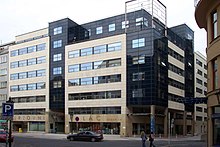This article needs additional citations for verification .(June 2020) |
| Foundation | January 1, 2001 |
|---|---|
| Operator | Budapest Stock Exchange |
| Exchanges | Central Europe |
| Constituents | 20 |
| Type | Large-cap |
| Weighting method | Free-float capitalization-weighted |
| Website | CETOP |
The Central European Blue Chip Index (CETOP) is a stock market index which reflects the performance of the companies with the biggest market value and turnover in the Central European region. [1]
Contents
The aim of the CETOP index is to serve as a benchmark for the portfolio managers who invest in the region. Blue chip equities of the Central European region are included in the index basket selected on the basis of global ranking, taking into account that a maximum of 7 securities from one stock exchange may be simultaneously included in the index. The index is reviewed twice a year, in March and September. [1] [2]
The eligible securities are those shares that are listed on at least one of the following Exchanges: [1]


